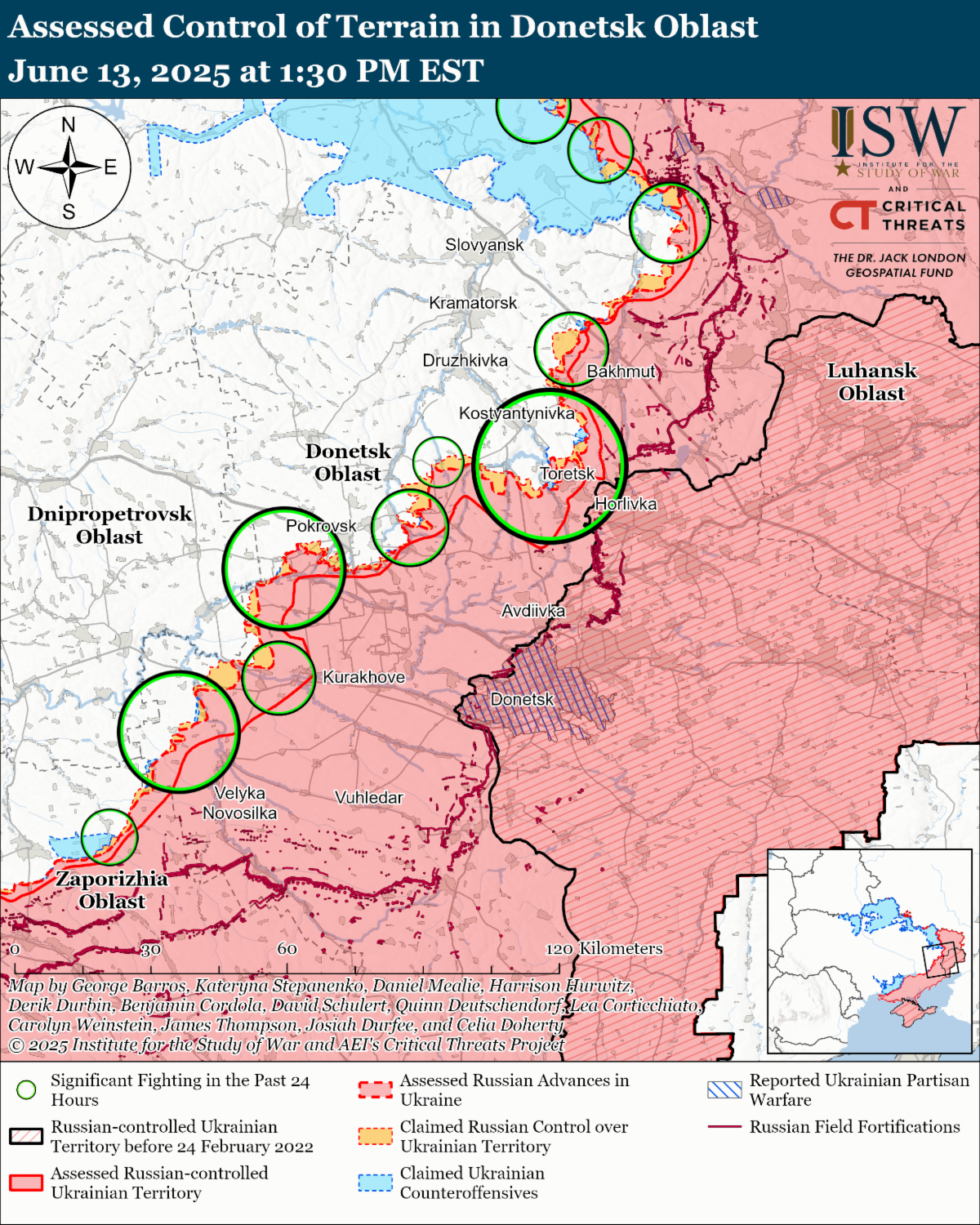Russian officials largely condemned the June 13 Israeli strikes against Iran, as Russian President Vladimir Putin continued to offer to facilitate negotiations on Iran's nuclear program. Putin had separate phone calls with Iranian President Masoud Pezeshkian and Israeli Prime Minister Benjamin Netanyahu on June 13. The Kremlin claimed that Putin condemned Israel's strikes as violations of the UN Charter and international law. Putin reportedly stated that Russia supports efforts to resolve the situation about Iran's nuclear program and noted that Russia has already suggested initiatives aimed at finding a "mutually acceptable agreement." The Kremlin claimed that Putin emphasized to Netanyahu the importance of returning to the negotiation process and resolving issues about Iran's nuclear program through political and diplomatic means. Putin reportedly told Netanyahu that Russia is willing to mediate talks between Iran and Israel.
The Russian Ministry of Foreign Affairs (MFA) condemned Israel's strikes against Iran and notably claimed that "unprovoked military strikes against a sovereign UN member state, its citizens, sleeping peaceful cities, and nuclear energy infrastructure facilities are categorically unacceptable." The Russian MFA claimed that these Israeli strikes against Iran undermined and set back efforts to find solutions to "eliminate any suspicions and prejudices regarding Iran's peaceful nuclear energy." The Russian MFA blamed Western states for provoking anti-Iranian "hysteria" in the International Atomic Energy Agency (IAEA), referencing a June 10 resolution that the United States and E3 (United Kingdom, Germany, and France) proposed to declare Iran as noncompliant with its nuclear safeguarding obligations. The Russian MFA issued travel advisories for Russian citizens for Israel and Iran. The Russian Embassy in Iran called on Russian citizens and "compatriots" in Iran to avoid military facilities and refrain from photographing or videoing "any part of Iran," and the Russian Embassy in Israel called for Russians in Israel to leave the country.
Other Kremlin officials condemned Israel and the West for the strikes and advocated for a political and diplomatic Israeli-Iranian settlement. First Deputy Chairperson of the Russian State Duma Defense Committee Alexei Zhuravlev claimed that Russia's ties with Iran, including military ties, can become closer if necessary. Zhuravlev claimed that Russia has provided Iran with air defense systems and praised Iran's military technology, including technology that Russia helps Iran develop. Zhuravlev criticized the West for perpetuating "global injustice" and inequality and claimed that Russia's war in Ukraine is aimed at fighting this injustice.
Oil price increases following Israeli strikes against Iran may increase Russian revenue from oil sales and improve Russia's ability to sustain its war effort in Ukraine. Brent crude oil futures prices rose by over five percent to $74.47 per barrel on June 13 following the Israeli strikes against Iran. Russia's oil and gas earnings accounted for roughly 30 percent of total federal revenues in 2024, underscoring the significant role oil and gas revenues play in financing Russian government spending. ISW previously assessed that compounding economic constraints on Russia are increasingly hindering Russia's ability to sustain a prolonged war effort in Ukraine. Russia may be able to leverage sudden upticks in oil prices to weather economic challenges and finance a protracted war in Ukraine, assuming the price of oil remains high (such as over $60 per barrel). Russian President Vladimir Putin has previously signaled concern about reduced oil prices, suggesting that any reduction in the oil price would likely risk destabilizing Russia's economy.
Key Takeaways:
- Russian officials largely condemned the June 13 Israeli strikes against Iran, as Russian President Vladimir Putin continued to offer to facilitate negotiations on Iran's nuclear program.
- Oil price increases following Israeli strikes against Iran may increase Russian revenue from oil sales and improve Russia's ability to sustain its war effort in Ukraine.
- The Kremlin is continuing efforts to prepare the Russian defense industrial base (DIB) for a protracted war with Ukraine and a potential future war with NATO.
- Russia released the bodies of killed in action (KIA) Ukrainian servicemembers to Ukraine on June 13.
- Ukrainian forces advanced near Toretsk. Russian forces advanced in northern Sumy Oblast and near Chasiv Yar, Pokrovsk, and Velyka Novosilka.
| 




 [ISW] 이란 업데이트 스페셜 에디션: 이스라엘의 이란 공습, 2025...
[ISW] 이란 업데이트 스페셜 에디션: 이스라엘의 이란 공습, 2025...
 [ISW] 스페셜 리포트 | 이스라엘의 이란 공격: 이란 업데이트, 20...
[ISW] 스페셜 리포트 | 이스라엘의 이란 공격: 이란 업데이트, 20...